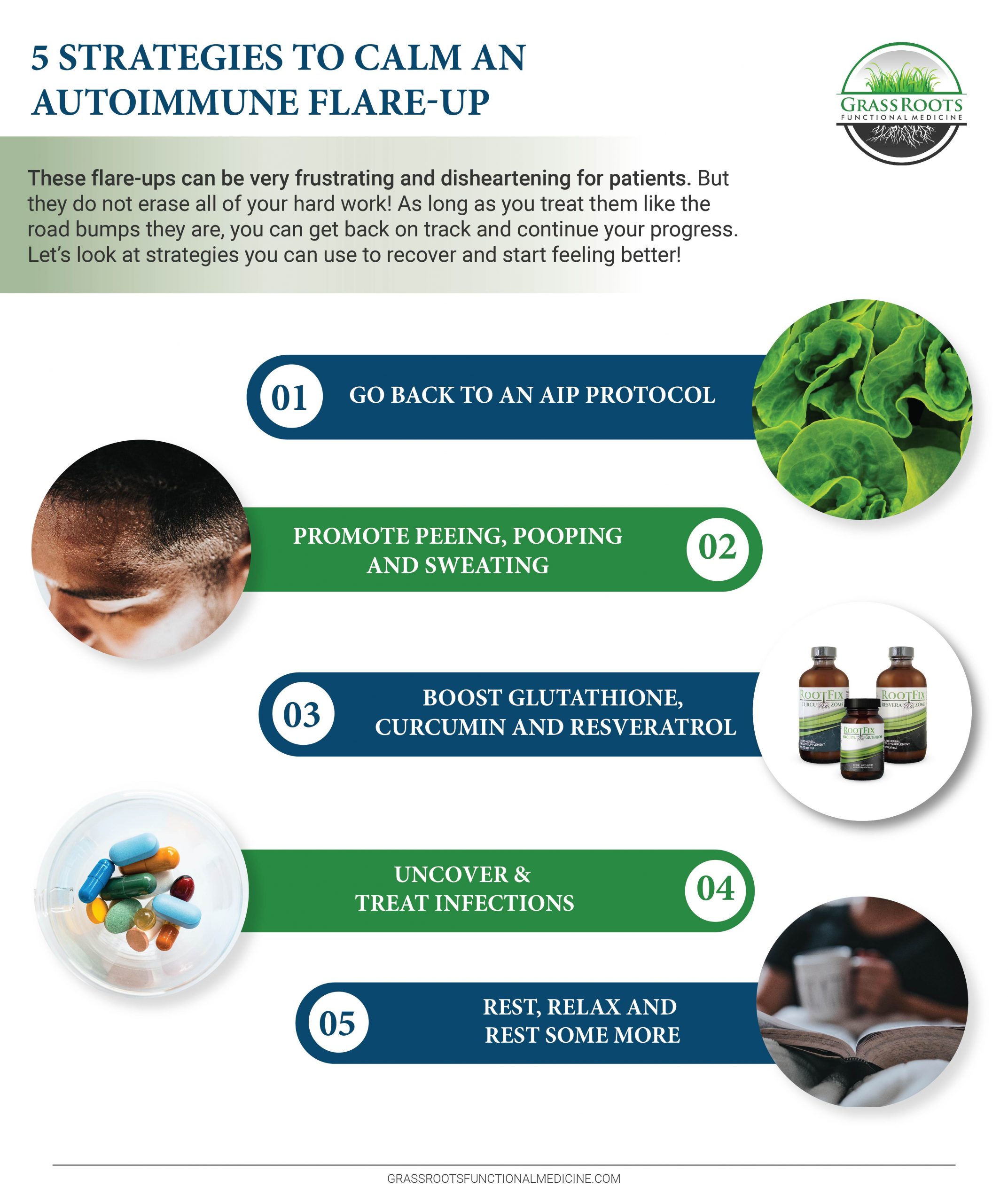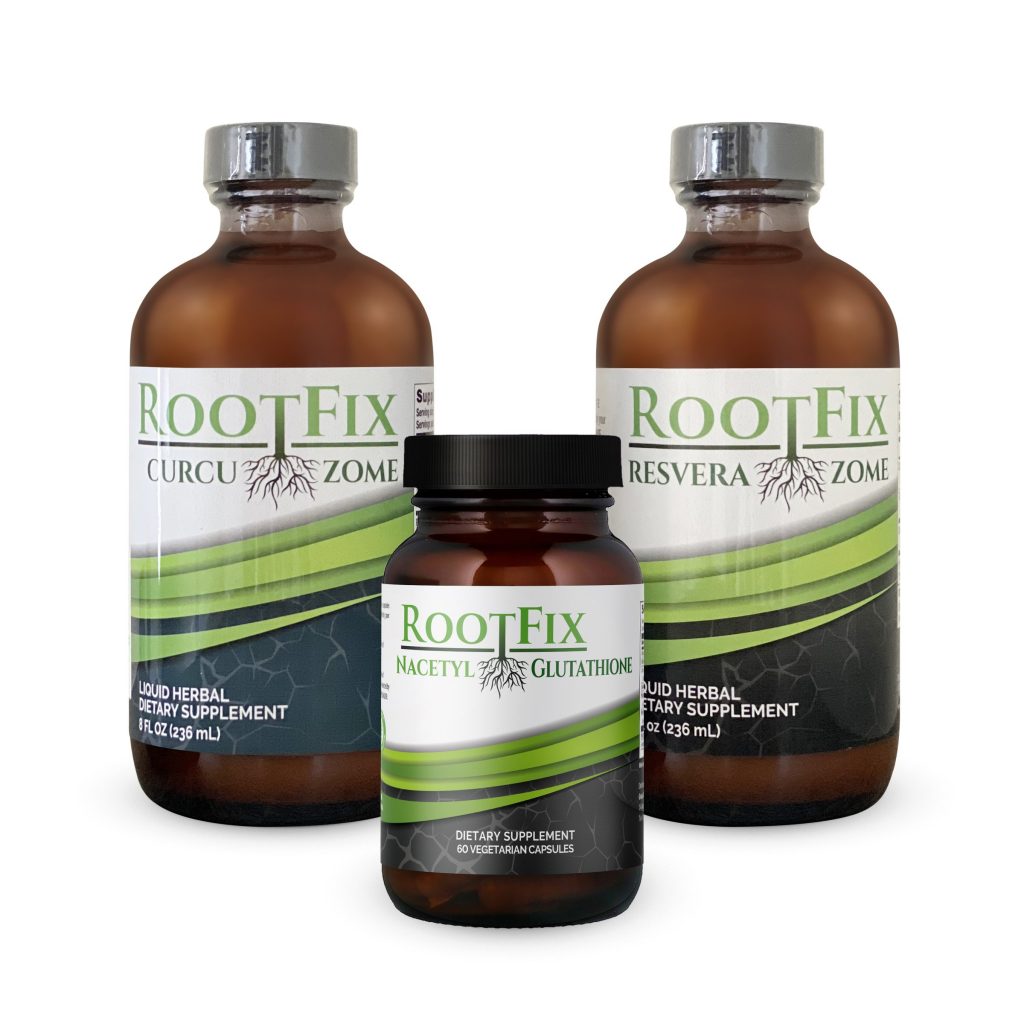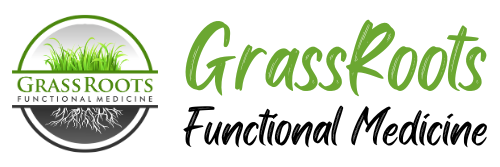One of the biggest challenges with chronic disease is when you get your symptoms under control, or even eliminate them, only to have them come back again.
These flare-ups can be very frustrating and disheartening for patients. But they do not erase all of your hard work! As long as you treat them like the road bumps they are, you can get back on track and continue your progress.
Let’s look at why autoimmune flare-ups happen and strategies you can use to recover and start feeling better!
Why Autoimmune Flare-Ups Happen
Autoimmune reactions occur when the immune system is overstressed. The same environmental factors that strain the immune system and trigger autoimmunity can also cause it to flare up.
The most common scenario I see is when a patient has been in remission and feeling great for a little while, so they get lax with their diet. A little cheese here, a slice of pizza there, a dessert every now and again…When this becomes too frequent, inflammation levels start climbing until the immune system can’t keep up and symptoms reappear.
Diet isn’t the only culprit though. Other common causes of autoimmune flare ups include a period of high stress, a toxin exposure such as mold, or an infection.
The first step is to work with your care team to determine what factor, or factors, caused the flare so that you can address it directly. This may require testing, such as an infection panel or a urine screen for toxins. The tips below will help lower your overall inflammation and reduce the strain on your immune system.
5 Tips to Speed Up Recovery from an Autoimmune Flare-Up
Use these strategies to calm your symptoms so you can start feeling better. Don’t overlook step #5 :).

1. Go Back to an AIP protocol
If your condition has been in remission, you may have expanded your diet and reintroduced potentially inflammatory foods that you personally tolerate. Right now, we want to decrease inflammation as much as possible.
Follow the Autoimmune Paleo (AIP) for a full 4 weeks, or until your symptoms resolve, by eliminating:
- Grains
- Legumes
- Dairy
- Eggs
- Nightshades
- Nuts and seeds
Toxic foods – sugar, alcohol, caffeine, processed and junk foods
Prioritize anti-inflammatory foods, leafy greens, cruciferous vegetables, and grass-fed, free-range protein. These will provide the essential nutrients for immune function, including selenium, zinc, magnesium, omega 3 fatty acids, vitamin D, and B vitamins.
2. Promote Peeing, Pooping, and Sweating
Reducing your toxic burden and supporting detoxification will help reduce the strain on your body and immune system. Hydrate yourself by drinking plenty of filtered water in order to flush toxins out via pee, poop, and sweat. I like the Berkey water filtration system. For an added boost, add in lemon juice for a source of vitamin C, electrolytes, and bioflavanoids.
Infrared sauna therapy is an excellent and gentle way to promote sweating and detoxification without the stress of strenuous exercise. If you are near our West Lebanon, NH clinic, we offer infrared sauna sessions to patients and non-patients. Some fitness centers and spas also have infrared saunas available.
3. Boost Glutathione, Curcumin, and Resveratrol
Extensive research has shown that these three compounds decrease inflammation, support immune function, and help modulate the immune response to stop your body’s attack on itself.
If you are in the midst of a flare up and are struggling with symptoms, I recommend taking all three in supplement form, as the potency and concentration will be much higher. Research also shows they have a synergistic effect, meaning they are more effective when taken together than individually.
Look for emulsified micronized formulations of curcumin and resveratrol, such as RootFix Curcuzome and Resverazome to ensure proper absorption. For glutathione, choose an acetylated formula, such as Nacetylzome Glutathione.
 Save 5% when you bundle all three in the Autoimmune Support Kit!
Save 5% when you bundle all three in the Autoimmune Support Kit!
You can also boost your dietary levels by consuming turmeric (curcumin), red grapes, blueberries, and cranberries (resveratrol), and cruciferous vegetables, garlic, onions, vitamin C, and animal protein (precursors and synthesizers for glutathione).
4. Uncover and Treat Infections
There are a handful of infections known to trigger or worsen autoimmunity. If you’ve recently contracted one or had a latent infection reactivate, you may need further treatment.
Viral infections may require antivirals or additional immune support. Bacterial infections may require antibiotics, just be aware that they can disrupt your gut microbiome. Work with your doctor to weigh the pros and cons, and if you do start an antibiotic, take probiotics to help reestablish microbial diversity.
5. Rest, Relax, and Rest Some More
You are in recovery mode, your to-do list can wait. Get 7 to 9 hours of restorative sleep a night and remember to listen to your body. If you feel tired or run down, rest!
The one thing I do recommend working into your schedule is a daily stress relief activity. This can be meditation, journaling, a nature walk, yoga, deep breathing, a relaxing bath, etc. Stress has a direct impact on immune function and chronic inflammation, so finding ways to relieve it is key.
If you’re in the middle of a flare and are frustrated by the setback, remember progress isn’t always linear and that’s ok! Try to zoom out and look at the bigger picture. Recognize how far you’ve come and that you’re headed in the right direction.
I hope you find these tips helpful, and if you need one-on-one support with finding your root causes, getting the right testing, or putting a treatment plan into action, check out our Adaptation Programs.
About the Author: Dr. Seth Osgood is a Doctor of Nursing Practice, Board Certified Family Nurse Practitioner and Institute of Functional Medicine (IFM) Certified Practitioner. Dr. Osgood received his post-graduate training in Functional Medicine through the IFM and from working with Dr. Amy Myers. He has helped people from around the world improve their health utilizing a Functional Medicine approach.
Want to work with Dr. Osgood and the GrassRoots team? Become a patient in our West Lebanon, New Hampshire Functional Medicine clinic, our Burlington, Vermont Functional Medicine clinic, or our Austin, Texas Functional Medicine clinic!





